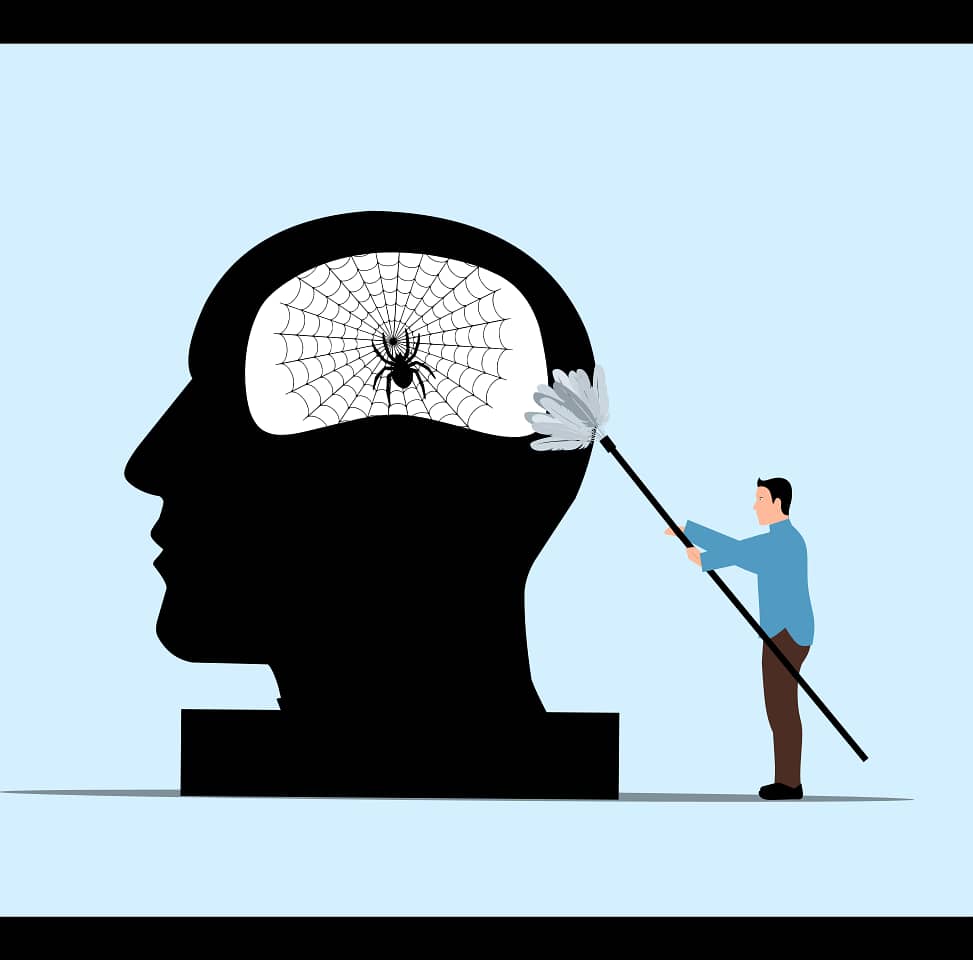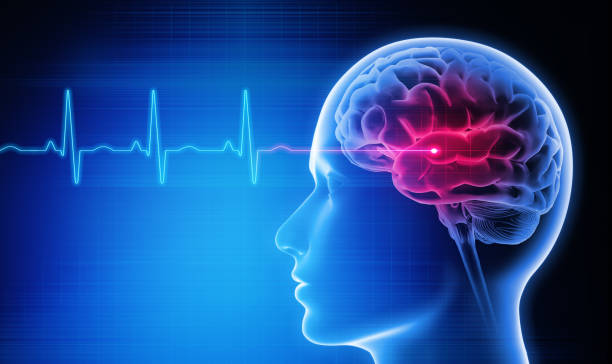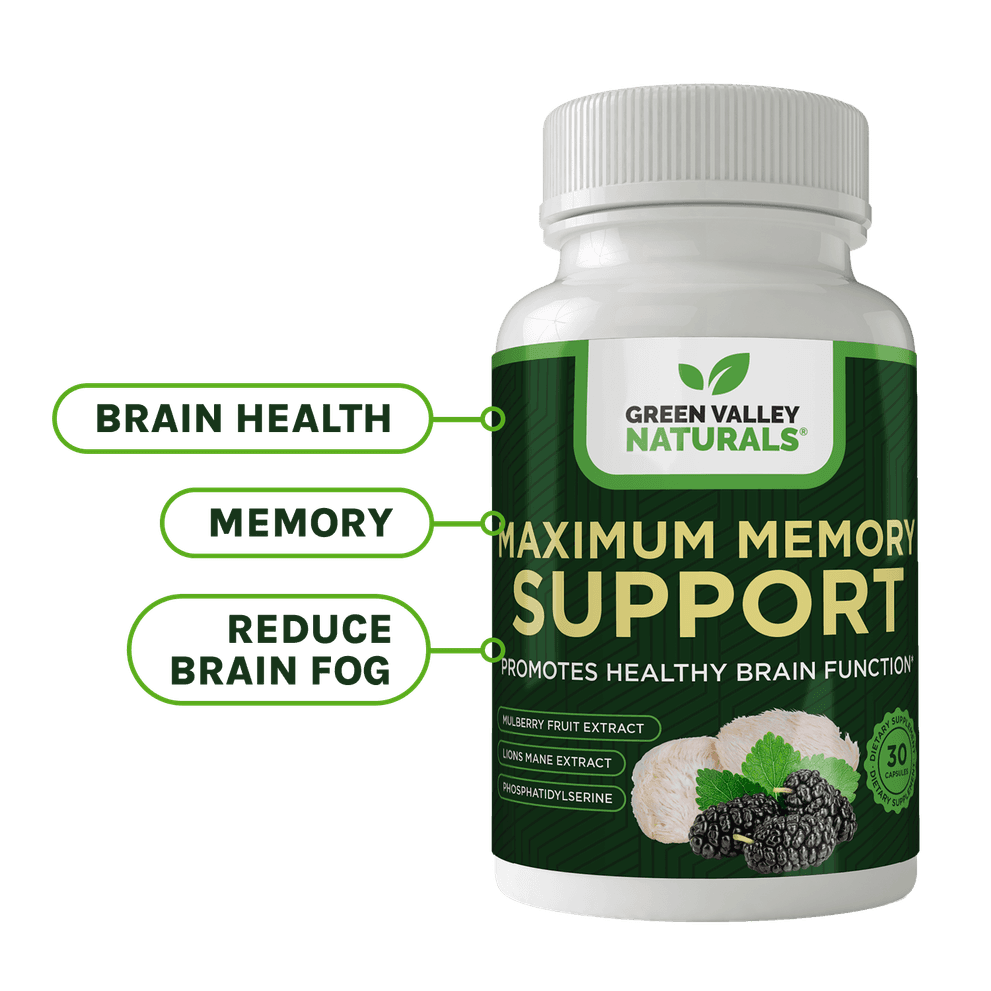
Unlock Mental Clarity: The Vitamins You Need to Banish Brain Fog for Good
What if the “cloudy” moments you blame on stress or a busy week are actually your brain asking for better fuel? There are vitamins that power neurotransmitters and help neurons communicate. These targeted nutrients—paired with a few simple daily habits—can help you trade mental haze for steady, confident clarity.
So, let's take a closer look at the best brain supplements to banish brain fog symptoms... and discuss the lifestyle hacks you can use starting today.
Key Takeaways
Fuel the signal: B-vitamins, magnesium, omega-3s, and antioxidant vitamins help support neurotransmitters, cellular energy, and healthy nerve function.
Food first, then supplements: Emphasize nutrient-rich meals; add well-chosen supplements to fill gaps or support specific goals.
Habits matter: The right sleep, hydration, movement, and stress care amplify the benefits of a brain-supportive diet.
Introduction to Brain Health
If you want great cognitive ability with sound memory, concentration, and thinking, you need a healthy brain that gets all the nutrients it needs. Nutrition plays a key role in your brain's health and function. Certain vitamins and supplements support brain cells and thereby, your cognitive performance.
Recognizing the value of brain health can help you undertake proactive steps to support your cognitive well-being and reduce the risk of cognitive decline. Brain health supplements can also help alleviate brain fog symptoms, and support overall cognitive function and mental clarity.
Understanding Brain Fog
What is brain fog? It is a cluster of symptoms that may make you feel spacey, like your head is in a cloud or a fog -- hence the name, brain fog. If you've ever driven some normal route in heavy fog, you'll appreciate how disconcerting it can be to not be able to clearly navigate something you've done dozens or hundreds of times before. That's brain fog.
Symptoms can include fuzzy thinking, lack of memory and inability to concentrate. Brain fog symptoms can be temporary, but they can cause loads of frustration, and difficulty executing daily tasks.
Causes of brain fog can range all over the board. It could be illness, such as long COVID. Or medication side effects, stress, lack of sleep, poor diet, toxins, hormone changes, or chronic health problems -- any of which can impact cognitive function and mental clarity.
Brain fog can have serious enough outcomes and can impact overall brain function and mental clarity, that you'll want to discover what's behind it and address the root causes, so you can support your brain with supplements and lifestyle changes. Brain fog supplements and a balanced diet can reduce symptoms of memory loss and confusion.
The Role of Nutrition in Brain Health

Your brain needs certain key nutrients to maintain healthy brain cells and support cognitive function. A balanced diet is foundational for optimal brain health. However, you may still need the aid of dietary supplements, especially if you've been eating a standard American diet for awhile, leaving your brain in a brain fog with memory loss due to a nutrient-deprived state.
So yes, there's significant evidence that nutrient deficiencies cause brain fog. Covering for the lack of those brain-boosting vitamins may be one of the simplest things you can do for your health.
Omega 3s are highly important for memory. Other dietary supplements for the brain include vitamin C, vitamin D, the vitamin B complex, and magnesium. These supplements have been shown in randomized clinical trials to support brain health and improve cognitive function, while reducing the risk of neurological symptoms and cognitive impairment.
Why Vitamins Matter for Brain Health
Nerve cells (neurons) are the special cells in your body that carry messages between your brain, spinal cord, and the rest of your body.
Neurons are highly specialized and demand a steady supply of nutrients to maintain their structure, function, and ability to send their signals. Several nutrients play critical roles in your nerve health, including supporting cell membrane integrity, myelin sheath repair, neurotransmitter balance, and overall brain resilience.
Your neurons are like tiny electrical wires that help you think, feel, move and react. They send signals using both electrical pulses and chemical messengers called neurotransmitters.
Your brain is full of nerve cells that talk to each other constantly. Your nerve cells are miraculous... they help you feel pain, remember things, move your fingers and toes, and even breathe without you thinking about it.
Vitamins act like fuel for your nerves. Without them, signals between your brain and body slow down or break down and communication stalls — causing symptoms that many people chalk up to aging or stress. In reality, they're often nutritional in origin.
If your cognitive function is faltering, start by examining your diet and whether it's providing the nutrients your brain needs. Or is it mostly packaged and fast foods that are nutrient-depleted?
Specific Vitamins for Brain Fog
Your brain is one of the neediest organs in your entire body, demanding a high level of key nutrients in order to function well. They include:
Vitamin B Complex: Essential for Brain Function
Vitamin B complex is absolutely critical for brain function. Interestingly, the B vitamins are an entire group of vitamins, not just one. They were discovered about the same time in the early 20th century. Since they all seemed related and were found in similar foods, they were grouped together and dubbed the "vitamin B complex."
At first, researchers believed they were just different forms of the same vitamin, so they numbered them: B1, B2, B3, etc. Even when they later discovered that each one had distinct chemical structures and function, the numbers stuck... with the exception of the ones that were reclassified because they didn't meet the modern definition of a vitamin. Therefore the current list goes from B1 to B12, with some gaps. The current list includes:
Number | Name | Primary Functions |
|---|---|---|
B1 | Thiamine | Helps convert carbs into energy; supports nerve and muscle function |
B2 | Riboflavin | Aids in energy production; supports vision, skin, and antioxidant defense |
B3 | Niacin | Helps with metabolism, skin health, and nervous system function |
B5 | Pantothenic Acid | Essential for making coenzyme A; helps metabolize fats, carbs, and proteins |
B6 | Pyridoxine | Important for neurotransmitter production, immune function, and cognitive energy. |
B7 | Biotin | Supports healthy hair, skin, nails, and metabolism of fatty acids and glucose |
B9 | Folate (Natural) / Folic Acid (Synthetic) | Crucial for DNA synthesis, cell division, and fetal development, also for mental clarity and cognition. The natural folate form is far superior. |
B12 | Cobalamin | Vital for red blood cell production, nerve function, and DNA synthesis. Needed for cognition, mood regulation, and preventing brain fog. |
The names for each of the B vitamins came later -- such as thiamine for P1 and folate for B9. But the numbers are easy to remember and are still widely used today.
B12, B6, and folate (B9) are needed for energy production and cognitive performance. They play a key role in maintaining healthy brain cells. But all eight of the B vitamins are considered absolutely essentialfor brain health. Research suggests that if lower B complex levels are associated with anemia, this could lead to poor cognition.
Benfotiamine, a special form of thiamine, protects the body and organs from sugar damage, and is being studied as a treatment for Alzheimer's disease.
Research suggests that B vitamins help slow cognitive decline and improve cognition, especially in older adults. They help mitigate the risk of mild cognitive impairment and Alzheimer's disease. Research suggests in addition that B vitamins may help alleviate brain fog symptoms and improve memory and mental alertness, making B complex an essential part of a brain health supplement regimen.
A meta-analysis found that B complex slows cognitive decline, especially when taken for more than one year by individuals without previous dementia. The study concluded that B vitamins and especially B9 (folate) benefited brain health.
Folate (B9) is especially important for cognitive health, with deficiencies linked to cognitive impairment and neurological symptoms. During pregnancy, folate deficiency can cause severe birth defects in the baby's spinal cord and brain, called neural tube defects. Of note, folic acid is the synthetic form of folate, both referred to as B9.
A B complex supplement can provide a balanced mix of B vitamins, which supports overall brain health and reduces risk of cognitive symptoms. B vitamins work synergistically, so a reasonably balanced B complex supplement is ideal. This may especially be true for niacin. Recent studies link megadoses of niacin to liver damage, increased risk of blood sugar issues, and even a higher mortality rate.
Vitamin D: The Sunshine Vitamin
Vitamin D is a source of confusion these days, because of dermatologists' admonition to avoid sunshine. While getting sunburned can cause problems, there's a middle ground of getting sensible sunshine, by getting into the sun without sunscreen for around 30 minutes per day (plus or minus). Note that sunscreen will prevent your skin from processing vitamin D from sunshine.
Because most people live the vast majority of their lives indoors and slather on sunscreen whenever they go out, vitamin D deficiency is rampant. Not only do people not get sun exposure during summer, but there's the problem of harsh winters with little to no sun exposure to the skin.
Dr. Michael Holick, MD, who has researched vitamin D extensively for the past forty years, recommends you get sunshine whenever possible, and that you also take a vitamin D supplement year round.
Vitamin D is highly protective of brain health. In the brain it supports nerve growth, protects against neuroinflammation, and supports memory and cognitive function.
Low levels of vitamin D are linked to nerve pain, depression, cognitive decline (including deentia), and brain fog.
A small study of 42 postmenopausal women who were low in vitamin D levels were supplemented with 2,000 IUs of vitamin D daily for one year. They scored better on learning and memory tests that those who took just 600 IUs and those who took 4,000 IUs.
Fortunately, vitamin D is a very easy-to-get and reasonably priced brain supplement. As for how much to take, Dr. Holick and most holistic healthcare practitioners recommend 2,000 IUs to 5,000 IUs per day. The RDA is substantially lower, with varying levels based on age.
The problem with the vitamin D RDA is that it's based solely on bone health, not whole body or brain health. Another concern is that the FDA is only enough to keep blood serum levels just above 20 ng/mL. Many functional medical doctors recommend a level of 50 to 80 ng/mL, which is targeted toward optimal whole body health.
Absorption levels can vary dramatically between individuals. Factors like sunscreen, indoor lifestyles, skin color (darker skin doesn't absorb D as well), obesity, and aging, all reduce natural vitamin D production from sunlight.
A simple blood test for 25-hydroxy vitamin D can help determine your true needs. Personalized dosing is key, especially for those with brain fog, mood swings, memory loss, or weakening bones. This allows you to tweak your vitamin D supplementation so you get into that vitamin D "sweet spot" of 50-80 ng/mL.
Vitamin E: Protecting the Brain from Oxidative Stress
Vitamin E is a powerful antioxidant and anti-inflammatory that protects nerve cell membranes from oxidative damage and inflammation.
Some studies (but not all) show a positive correlation between brain health and vitamin E intake. One study of 1,550 older adults found that those with highest vitamin E intake had a significantly lower risk of developing dementia over a 5.2-year period. Participants with the highest vitamin E intake had a 70% reduced risk versus those with the lowest intake.
Another study showed that lower plasma levels of vitamin E are linked with higher risk of memory loss. Deficiency can also result in coordination problems and nerve degeneration.
It's important to realize that vitamin E is not just one compound. It's actually a family of eight fat-soluble compounds: 4 tocopherols and 4 tocotrienols. Most standard supplements only include alpha-tocopherol, but a high-quality vitamin E supplement should ideally include all forms for full-spectrum antioxidant and neuroprotective benefits. Tocotrienols, especially, may penetrate deeper into cell membranes and may be more powerful antioxidants in certain contexts — especially for brain and cardiovascular health.
Choose a vitamin E supplement that includes the following three things:
Mixed tocopherols (not just d-alpha-tocopherol)
Tocotrienols, preferably from annotto, palm, or rice bran oil
Natural source d-alpha-tocopherol, rather than the synthetic "dl-alpha-tocopherol"
Other Key Vitamins
Vitamin C (ascorbic acid) plays an important but often underappreciated role in brain health — including reducing brain fog, supporting mental clarity, and protecting cognitive function over time.
Here’s a breakdown of vitamin C's key benefits:
Highly valuable for the hippocampus (memory center). Protects neurons from damage by neutralizing free radicals.
Supports neurotransmitter production. Low vitamin C levels can lead to sluggish thinking, poor mental clarity, and bad mood.
Helps regenerate other brain nutrients including vitamin E and glutathione.
Protects the myelin sheath that speeds communication between brain cells.
Overall, vitamin C helps reduce brain fog by protecting neurons, supporting neurotransmitter production, and maintaining brain structure and blood flow. It’s especially valuable during periods of stress, illness, aging, or poor diet.
Vitamin A plays a foundational role in brain clarity and long-term cognitive function. It supports neurotransmitters, reduces inflammation, and promotes neuroplasticity — all key in preventing or reducing brain fog. Vitamin A deficiency may impact brain function and symptoms of brain fog including:
Mental fatigue and brain fog
Mood instability or irritability
Trouble concentrating
Poor memory
Sleep disturbances
Other helpful nutrients include L-Theanine, Curcumin, and CDP-Choline.
How to Obtain These Vitamins: Diet vs. Supplements
Vitamin-Rich Foods for Brain Health
The best way to support your brain health is to consume vitamin-rich foods at every meal. But you may still fall short. For one thing, no one is perfect at this. However, when you eat real, live foods, you're getting a host of nutrients, some of which perhaps haven't even been discovered or named yet.
You can get B vitamins from foods like leafy green vegetables, eggs, fish, meat, and fortified cereals. It's nearly impossible to get vitamin B12 without eating meat, so if you're a vegan or vegetarian, you'll definitely want to supplement B12.
Vitamin D comes primarily from sunlight exposure to your skin. You can get a bit from foods like fatty fish, egg yolks, and fortified foods. But plan on getting 30 minutes plus/minus per day of sunlight on your face, arms, and legs... and/or supplement with vitamin D. Most people have vitamin D levels below the 50 to 80 levels recommended by holistic doctors and traditional Chinese medicine. In other words, most people need to supplement with vitamin D3 to get sufficient levels.
Vitamin E can help reduce brain fog by protecting brain cells from oxidative stress and supporting healthy nerve function. It is found in nuts, seeds, and leafy green vegetables.
Omega 3 fatty acids are a key brain supplement, and are found in fatty fish, with docosahexaenoic acid (DHA) and eicosapentaenoic acid (EPA). Omega 3s help reduce mental fog.
Alpha-linolenic acid (ALA) is an essential omega-3 fatty acid found primarily in plant-based foods. Your body can convert some ALA into the more active forms of omega-3s — EPA and DHA. But the conversion is quite limited, making it best to consume a variety of omega-3 sources. Again, if you're a vegan, this will be challenging and you should supplement. Plus, due to mercury contamination, omega 3s are often best gotten through supplements anyway.
Vitamin C is best known for its immune system health. But it is also needed for brain clarity. Citrus fruits are a common source of vitamin C, along with other fruits and vegetables, such as bell peppers.
Magnesium intake does wonders for brain health and reduces stress. It is found in abundance in spinach and other leafy green vegetables, nuts (almonds, cashews), seeds (chia seeds), avocados, and dark chocolate.
Amino acids can play a critical role in reducing brain fog by supporting neurotransmitter production, mental energy, and detoxification. Brain fog often results from imbalances in brain chemistry, inflammation, or poor nutrient status. Therefore certain amino acids can directly or indirectly help restore clarity and focus.

Supplements Can Really Help
Certain situations like aging or illness require the addition of supplementation to nourish your brain and support crystal clear cognition.
For example, if you've been eating a poor diet low in docosahexaenoic acid (DHA), eicosapentaenoic acid (EPA), and magnesium for some time, you may need the support of additional vitamins due to depleted levels.
In addition, you may not absorb nutrients as well as you age. So older adults should likely err on the side of brain supplements. Plus, memory loss occurs more often in older adults, giving you another reason to choose brain supplements.
If you're experiencing brain fog symptoms, certain supplements may help you quickly reduce mental fog, improve memory, and see significant improvements in brain function.
Likewise, if you have any nerve problems including tingling, numbness, or memory loss, you'll want to supplement with B vitamins as soon as possible to support your nerve cell membranes and function.
In the case of vitamin D, most people are woefully deficient, according to longtime vitamin D expert, Dr. Michael Holick. He recommends supplementing with vitamin D even in the middle of the summer, so as not to add mental fatigue to heat fatigue.
For magnesium, choose L-threonate, which crosses the blood brain barrier, improves mental alertness, reduces stress related symptoms, and supports the nervous system. Magnesium L-threonate is marketed under the brand name Magtein™, and is especially helpful for those struggling with brain fog related symptoms, memory loss, and anxiety.
For brain fog supplements, you can choose individual vitamins, or a blended supplement along the lines of a multivitamin, but focused on the brain.
Combine Diet and Supplements for Optimal Results
You'll get best results by striking a balance between food and supplements. And you may even perform better on memory tests or just in daily life by using a blend of the two. Let's face it, most of us aren't perfect in our dietary choices, and absorption problems can wreak havoc too with aging. Brain health supplements can help cover us when we're first trying to alleviate brain fog symptoms, as well as during life's chaotic times when our choices are less than perfect.
There's also benefits to gaining fast traction to get neurons rebalanced and back on stable footing, and banish brain fog for good.
Simple, Natural Strategies for Managing Brain Fog
Coming full circle back to the idea of root causes of brain fog symptoms and how to address those causes, a number of simple lifestyle remedies can be our brain's new best friends. Especially if you can't uncover any underlying medical conditions.
Regular physical exercise improves blood flow to the brain, and aids cognitive function. Aim for at least 150 minutes per week or more of moderate exercise.
Your brain can't function without sleep! Quality sleep for 7 to 9 hours per night can greatly restore mental clarity. Keep the same bedtime and wake-up time every day, and sleep in a dark, cool room.
Manage stress through meditation, mindfulness, and relaxation practices. Remember that magnesium helps relieve stress and promote sleep.
Stay hydrated. Neither your brain nor any other organ operates optimally when dehydrated.
Eat a balanced Mediterranean or DASH diet at least 80% of the time. Avoid processed foods, which are nutrient-depleted and can cause brain fog.
Summary
The brain relies on a steady supply of vitamins, minerals, amino acids, and healthy fats to produce its neurotransmitters, protect neurons from oxidative stress, and maintain clear, consistent signaling between nerve cells.
Deficiencies in key nutrients—such as B vitamins, vitamin D, omega-3 fatty acids, magnesium, and antioxidants like vitamins A, C and E—can significantly disrupt this balance, leading to symptoms like mental fatigue, poor concentration, forgetfulness, and mood swings.
Eating a nutrient-rich diet and adding targeted supplementation helps fuel brain energy, reduce brain inflammation, and support cognitive clarity, memory, and emotional stability. It likely won't happen overnight if you're severely depleted. But stick with it, because your brain is a real nutrient hog. Keep working to rebalance it.
Frequently Asked Questions
Which vitamins help with brain fog?
The best vitamins to help resolve brain fog include the B complex vitamins, vitamins A, C, D, and E, in addition to magnesium and omega 3 fatty acids.
What am I lacking if I have brain fog?
There are many reasons a person can get brain fog. It can be triggered by an underlying medical condition or autoimmune disease, as well as lifestyle factors like a sedentary lifestyle, poor diet, lack of nutrients, dehydration, stress, and more. Addressing all these issues, plus uncovering any underlying conditions are keys to reversing brain fog. Also look for nutrient shortages including vitamins A, B complex, C, D, E, omega 3 fatty acids, and magnesium.
Can low B12 cause brain fog?
Yes, insufficient vitamin B12 can cause brain fog. Vitamins B6, B9 (folate) and B12 play important roles in brain function and neurotransmitter support. And depleted levels can induce brain fog.
Can low vitamin D cause brain fog?
Vitamin D, also known as the sunshine vitamin, does far more than just protect bones. It protects your brain and neurotransmitters, and other aspects of overall health. Low levels can cause brain fog, so getting your vitamin D blood levels checked would be a very smart thing to do if you have brain fog. If below 50 ng/mL, start taking more vitamin D. An integrative physician can help you with dosing.
Are there any vitamins that can improve brain fog and fatigue?
Yes, quite often supplementing with brain health supplements and improving your diet can improve brain fog and fatigue. Key brain health supplements include vitamins A, B complex, C, D, E, magnesium, and omega 3s. If you're experiencing brain fog symptoms, see if adding these resolves your brain fog.
Low dietary vitamin E intake is associated with high risk of incident dementia among older adults: The Shanghai Aging Study. Frontiers in Nutrition, November 2022. https://www.frontiersin.org/journals/nutrition/articles/10.3389/fnut.2022.1036795/full
The Role of Vitamin E in Slowing Down Mild Cognitive Impairment: A Narrative Review. Healthcare 2021, 9(11), 1573;://www.mdpi.com/2227-9032/9/11/1573
The Impact of Daily Vitamin Intake on Brain Fog in Fibromyalgia. The Journal of Pain, March 2018. https://www.jpain.org/article/S1526-5900(17)31048-9/fulltext
6 Best Evidence-Based Supplements for Brain Fog, HealthLine. https://www.healthline.com/nutrition/vitamins-for-brain-fog
Can Certain Nutrient Deficiencies Cause Brain Fog? https://www.healthline.com/nutrition/can-not-enough-nutrients-cause-brain-fog
Don't Buy Into Brain Health Supplements. Harvard Health Publishing, August 8, 2023. https://www.health.harvard.edu/mind-and-mood/dont-buy-into-brain-health-supplements
Brain Supplements that Do and Don't Work. WebMD, September 29, 2023. https://www.webmd.com/brain/ss/slideshow-brain-supplements
5 Supplements for Managing Brain Fog. Health.com, December 10, 2024. https://www.health.com/supplements-for-brain-fog-8709220
Fight Brain Fog with Four Key Vitamins for Mental Clarity. CNET, April 22, 2025. https://www.cnet.com/health/nutrition/key-vitamins-to-combat-brain-fog/
Brain Fog: Solutions to Help You Improve Concentration. International Hospital, Feb. 27, 2020. https://www.bangkokhospital.com/en/bangkok-bone-brain/content/brain-fog-syndrome




